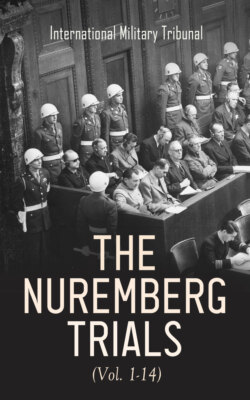Читать книгу The Nuremberg Trials (Vol. 1-14) - International Military Tribunal - Страница 10
На сайте Литреса книга снята с продажи.
II. JURISDICTION AND GENERAL PRINCIPLES
ОглавлениеTable of Contents
Article 6. The Tribunal established by the Agreement referred to in Article 1 hereof for the trial and punishment of the major war criminals of the European Axis countries shall have the power to try and punish persons who, acting in the interests of the European Axis countries, whether as individuals or as members of organizations, committed any of the following crimes.
The following acts, or any of them, are crimes coming within the jurisdiction of the Tribunal for which there shall be individual responsibility:
| (a) | CRIMES AGAINST PEACE: namely, planning, preparation, initiation or waging of a war of aggression, or a war in violation of international treaties, agreements or assurances, or participation in a Common Plan or Conspiracy for the accomplishment of any of the foregoing; |
| (b) | WAR CRIMES: namely, violations of the laws or customs of war. Such violations shall include, but not be limited to, murder, ill-treatment or deportation to slave labor or for any other purpose of civilian population of or in occupied territory, murder or ill-treatment of prisoners of war or persons on the seas, killing of hostages, plunder of public or private property, wanton destruction of cities, towns, or villages, or devastation not justified by military necessity; |
| (c) | CRIMES AGAINST HUMANITY: namely, murder, extermination, enslavement, deportation, and other inhumane acts committed against any civilian population, before or during the war,11 or persecutions on political, racial, or religious grounds in execution of or in connection with any crime within the jurisdiction of the Tribunal, whether or not in violation of domestic law of the country where perpetrated. |
Leaders, organizers, instigators, and accomplices participating in the formulation or execution of a Common Plan or Conspiracy to commit any of the foregoing crimes are responsible for all acts performed by any persons in execution of such plan.
Article 7. The official position of defendants, whether as Heads of State or responsible officials in Government departments, shall not be considered as freeing them from responsibility or mitigating punishment.
Article 8. The fact that the defendant acted pursuant to order of his Government or of a superior shall not free him from responsibility, but may be considered in mitigation of punishment if the Tribunal determine that justice so requires.
Article 9. At the trial of any individual member of any group or organization the Tribunal may declare (in connection with any act of which the individual may be convicted) that the group or organization of which the individual was a member was a criminal organization.
After receipt of the Indictment the Tribunal shall give such notice as it thinks fit that the Prosecution intends to ask the Tribunal to make such declaration and any member of the organization will be entitled to apply to the Tribunal for leave to be heard by the Tribunal upon the question of the criminal character of the organization. The Tribunal shall have power to allow or reject the application. If the application is allowed, the Tribunal may direct in what manner the applicants shall be represented and heard.
Article 10. In cases where a group or organization is declared criminal by the Tribunal, the competent national authority of any Signatory shall have the right to bring individuals to trial for membership therein before national, military, or occupation courts. In any such case the criminal nature of the group or organization is considered proved and shall not be questioned.
Article 11. Any person convicted by the Tribunal may be charged before a national, military, or occupation court, referred to in Article 10 of this Charter, with a crime other than of membership in a criminal group or organization and such court may, after convicting him, impose upon him punishment independent of and additional to the punishment imposed by the Tribunal for participation in the criminal activities of such group or organization.
Article 12. The Tribunal shall have the right to take proceedings against a person charged with crimes set out in Article 6 of this Charter in his absence, if he has not been found or if the Tribunal, for any reason, finds it necessary, in the interests of justice, to conduct the hearing in his absence.
Article 13. The Tribunal shall draw up rules for its procedure. These rules shall not be inconsistent with the provisions of this Charter.
